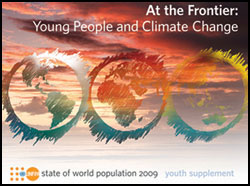News
Looking at Climate Change through the Eyes of the Young: Youth Report Tells Their Stories
- 18 November 2009
News
NEW YORK — Many young people are already living in cultures that are changing rapidly in response to a degraded environment. And they are also the ones who will have to grapple with the increasing challenges climate change will present in the coming decades.
This year’s Youth Supplement to the State of the World Population 2009 examines the courage and resilience of seven young people in the face of such challenges:

Learn more about the lives of these and four other young people in the supplement, At the Frontier: Young People and Climate Change. This qualitative report complements and echoes the main messages of this year’s State of World Population through the stories and voices of young people. It examines what climate change may mean for the lives, livelihoods, health, rights and development of young people in vastly different circumstances – from a farmer in drought-stricken Niger to a community organizer in hurricane-stricken New Orleans.
“If one looks at the level of engagement and activism among young people in the run up to Copenhagen [the United Nations Climate Change Conference taking place this December] or read some of the stories in the report, you realize that young people are taking on as much responsibility as they possibly can,” said Dr. Laura Laski of UNFPA, the United Nations Population Fund. “There is certainly not a problem with unconcerned youth out there – the problem is that they are seldom given the space they deserve, or the support they need to be able to fully participate.”
This is the fourth year in which UNFPA has produced a Youth Supplement to its flagship publication, with the aim of giving more space to the lives and views of young people, who are one of the agency’s top priorities. Both reports will be released on 18 November 2009.